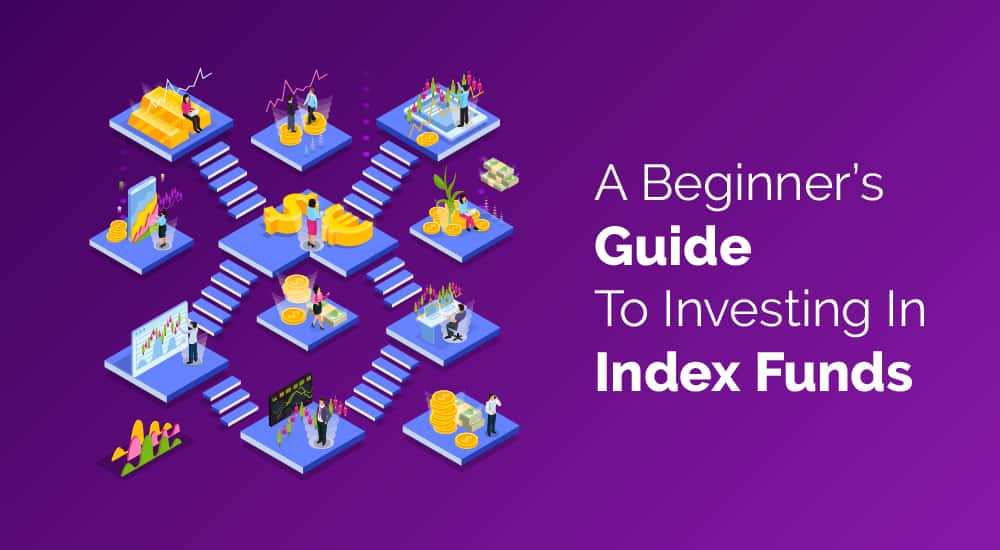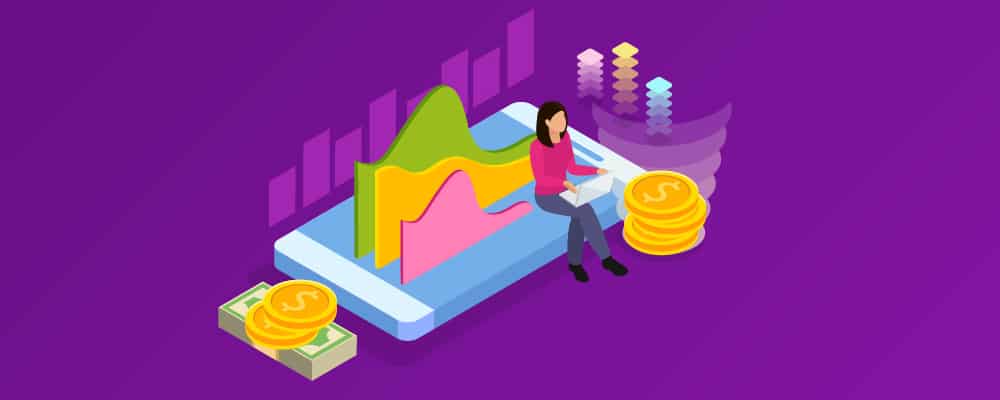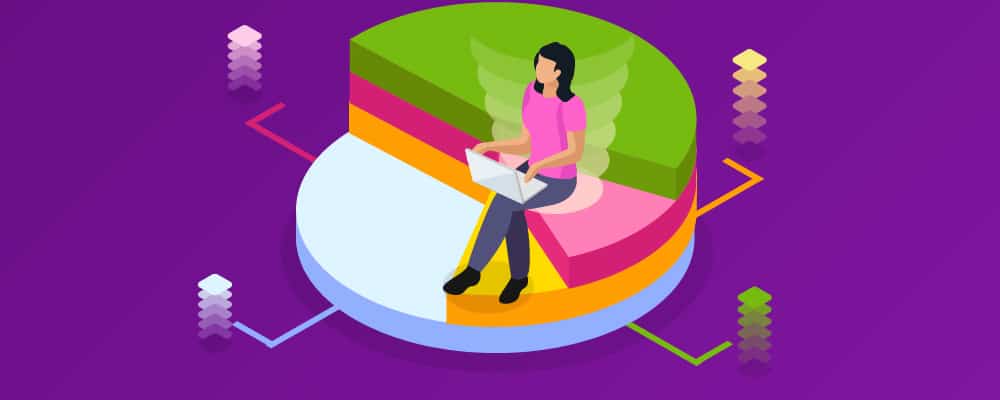This article will teach you everything you need to know about investing in index funds.
Introduction
Given the economic circumstances and the newly-found free time many people had in 2020, investing has become more popular than ever.
However, no investment is without risk, and it’s hard for beginners to cut their teeth in the stock market without losing cash.
Any trader will tell you that to lower the risk of financial loss when investing, you should diversify your portfolio and only put in small, incremental amounts that you can afford to lose.
That’s where index fund investing comes in. When many hear about index funding, it’s likely that The Vanguard Group is what comes to mind.
This is because John Bogle, nicknamed Jack at the time, is considered the pioneer of index fund investment after founding Vanguard in 1974.
Today we’re going to take you through this investment type and explain how you can participate in the market in a way that’s low-risk yet yields results.
We’ll do this by answering the following questions beginners may have:
- What are index funds and how do they work?
- Why should you invest in index funds?
- What are the benefits of index funds?
- What are the different types of index funds?
- How do I choose the right index fund for me?
- What do I need to get started?
- Are there any downsides?
As you can see, we have a lot of ground to cover, so let’s get right into what index funds are and how they work to benefit low-risk investors.
What Is An Index Fund?
First, it helps if we know what an index fund actually is.
Index funds are alternative investment funds that come in one of two typical types, those being a mutual fund or an exchange-traded fund, which you may have heard called ETFs in the past.
Now, we’ll go into the differences between mutual funds and ETFs later; for now, let’s focus on the commonalities between them.
Index funds combine many investments together, making investing simpler and easier to diversify.
What we call the index is a collection of stocks, which will either be organized by the index fund managers themselves or a third-party brokerage firm.
Notable examples you may have heard of include the S&P 500 or the Dow Jones Industrial Average. Once an index is targeted, the fund aims to mimic that index as closely as possible through investment.
You buy a share of an index fund as if it were stock when it’s really a share of the entire account that spans many different industries.
For example, you’d need to invest and manage all of these stocks individually if you were an independent retail investor.
So, you can see now why index fund investing is easier to diversify with no extra effort on your part, right?
Because the index fund is managed by others and has many index investors buying their share in them.
You get to choose which index you enter into, so it doesn’t have to be as notorious as the Dow Jones.
You can choose a smaller index based on industries and resources that personally interest you if you wish.
There’s no limit on how many you can get too, so having multiple index funds in different sectors is a great way to reach maximal investment diversity.
If one index fund enables you to have a finger in many pies, having many index funds means you have a lot of hands to work with, all with minimal effort on your part.
Also Read: Motley Fool Rule Breakers Review
How An Index Fund Works
Now that we’ve outlined the basics, the best way we can show you how an index fund works is by describing how one will work for you.
Since you’re here, we can assume you’re interested in starting an index fund investment.
Let’s say you take the leap, here’s a step-by-step breakdown of what you should expect.
- You choose an account
Before you do anything, you need to have an account to work with.
If you’ve already dipped your toes into the investment space, you might already have an account with a broker that offers index funds.
Check out any accounts you have with online brokerages to see if any of them have index funds available to you.
Otherwise, you’ll need to find one.
Ask yourself two questions: “What kind of investor am I?” and “which funds appeal to me the most?”
If you’re a very casual, hands-off investor then the due diligence you do before coming to a decision will obviously be less than someone who has experience as a retail investor who’s worked with stocks in the past.
Since many index fund-supplying brokers cater to the casual investor base, there’s more chance that they won’t have the metrics and charts that a skilled investor will want to see.
If that’s fine for you, great! If not, you’ll want to find a more advanced trading platform.
Then you need to select the index fund itself.
Sure, some indexes will be based around the Dow Jones and other popular examples, but most funds aren’t standardized.
This means that the funds you’d find on our aforementioned broker, Vanguard, will not be the same as those you get with a different online brokerage.
Many beginners won’t think much about that, and that’s fine, but if you do want to shop around first then you’ll want to explore several brokerages to find the fund you personally like.
- You choose an investment strategy
Next, you need to come up with a strategy.
Strategic talk can be intimidating for beginners, especially when your money is on the line, but it really is quite simple so there’s no need to worry.
We’ve already said that funds can be based around industries.
For example, interest in index funds based around energy and green energy investments have become popular amid growing climate activism.
Well along with industries, they can also be based on the type of companies the fund supports. These are usually split by geography and business size.
A good example is the S&P 500 that focuses only on the 500 largest companies in the US because, well, they’re the largest in the country for a reason, they must be doing something right.
Along with that, you get funds that support not just stocks but treasuries and bonds too.
You need to decide where you’re going to hang your hat. Many go for the S&P for their first fund since it covers a lot of stock and has that “too big to fail” factor that careful investors love.
Remember that you’re not limited to just the one fund, however.
- You run the numbers
Index funds have a reputation for being the ideal choice for risk-aware, low-cost investors who are looking for an inexpensive means of investment.
Every rule has its exceptions, however, so if you have more liquid cash to throw around then there are many funds that you can use.
Vanguard, as one of the largest and most notable index fund providers, have several high-expense funds in their arsenal.
So, let’s get into what an expense ratio is.
Index funds aren’t actively managed in the same way a retail investor, mutual, or hedge fund operates on the stock market, but they do still have administrators who keep everything in order and must pay maintenance costs to keep the index fund afloat.
Those costs need to be paid from somewhere and the best way to do this is usually by taking a small cut from everybody’s returns.
Yes, that means your returns too.
When running the numbers, keep the expense ratio and your minimum investment amount in mind.
As we said, expense ratios are essentially management expenses for the fund, and it’s usually done by dividing the fund’s operating expenses by the average value of its assets under management in dollars.
Index funds don’t usually have as high an expense ratio as other funds but we’d still advise you to shop around and find a ratio you’re comfortable with.
As for the minimum investment amount, this is just how much you need to place into the fund to be able to buy-in.
These don’t usually come into play with ETFs but exist in other index funds.
This amount has a relationship with the expense ratio too.
The higher the expense ratio, the lower the buy-in amount as they get more from their client’s returns.
- You fund your account
Index funds are a popular means of filling a 401(k) retirement plan, so if you have one of those then you can easily allocate paycheck deductions into an index fund of your choice.
Otherwise, you’ll have to deposit directly into your brokerage account.
This is easily done by using your brokerage of choice’s funding method.
Some casual brokerages can do this instantly while more serious establishments may require a bank transfer that takes a few days.
- You buy up index fund shares
Once you know what you’re doing and you have the cash ready, you need to buy shares in your chosen index fund to get started.
If you’ve yet to decide which index fund you want to go with then there’s no worry, you can leave the money in the account and wait until you’re ready.
Remember to check out not just the index type that the fund is targeting but also what’s included in the fund, whether it’s just stocks or other assets too.
If you plan on buying into multiple index funds, it’s best to go with a casual, low-cost brokerage as they’ll be easier to find and keep organized, and there’s less likelihood that you need to pay a premium to participate in other index funds provided by third parties.
Also Read: Mindful Trader Review
Why You Should Invest In Index Funds
So, we know how index funds operate and how they work for you, so why should you invest in them?
The best way to show you why you should invest in an index fund is to tell you the benefits of investing in them.
Here are some examples of what index fund investing can do for you.
Benefits Of Index Funds
Before we get into the benefits, you should know that if you’re a small investor, index funds are perfect for you.
If you are a small-time investor, keep that in mind with the following benefits.
- Low Minimum Investment – This means you don’t need to have thousands to start investing. You can begin investing with a few bucks you have to spare, so you’re not closed out of the market by higher investment thresholds.
- Ease of Diversification – Diversification is important in investing. The nature of index funds means that you can tie up investments with many different stocks and assets at once, making vital diversification easier than ever. Combined with the lower investment minimum, you have the ability to make a small amount of cash spread a long way.
- Lower Risk – With diversification comes less risk. This makes index funds less risky simply by how they’re constructed and operated. Also, to be frank, they’re managed by professionals who probably know the market better than beginners like you, so there’s not as much operational risk too.
- Lower Cost – Index funds don’t just have a lower minimum investment, they’re also cheaper to be a part of. If you’re going for an index-based ETF, trading can be conducted without having to pay any commission. When you get your investment results, you won’t have to worry about trading fees scraping some of it off.
- Favorable Tax Consequences – Index funds are also less taxed than other types of managed funds. This is because they don’t trade securities, so they accrue fewer capital gains that can be targeted for taxation. This means you don’t need to worry about tax until the day comes where you sell your index fund position.
- Lower Expense Ratios – Continuing with index fund positions being cheaper to have and participate in, they also have a lower expense ratio.
Most of the index funds a beginner will want to participate in won’t exceed 0.20% per year expense ratio, once again ensuring that your investment performance isn’t dragged down by operating costs.
- Investing, Simplified – Index funds can be acquired as if they’re stocks, allowing you to invest in a lot of different companies for much less effort than if you were doing it all yourself. The same can be said for index-based ETFs, which also don’t have brokerage commissions tied to them.
- Passive Investing – Index funds grow with the market and how that market performs, so you’re not swapping stocks in and out as they rise and fall, which comes with its own risks. Instead, index funds only require that you buy into them and relax as it slowly but surely appreciates over time, making them perfect for passive investors.
- Portfolio Customization – Index funds offer a wide array of customization to those who go looking for them. There’s a fund for every sector and geographic region of the market, so you’re spoiled for choice.
- They Can Be Transparent – Since index funds mirror indexes that can be searched online, investors can see exactly what they’re investing into. Casual investors won’t, of course, but it’s a great benefit for careful investors who prefer to know exactly what they’re investing into, whether that’s for financial or ethical purposes. We have covered ethical investing and which options are available to you later in this guide.
It’s these nine simple but effective advantages that have seen index funds become incredibly popular over the last decade, with both civilian investors and professionals who are trained in more turbulent forms of investing.
If they sound like what you’ve been looking for when it comes to your investments, then index funds might be what you want to use.
There are downsides, however, and we’ve included them later in this guide, so read on to make sure you understand index funds before making any decisions.
First, we need to look at the different types of index funds you can get.
Different Types Of Index Funds Explained
While the index fund has a humble origin, there are now many different investment systems and strategies that come under the same banner.
They all share commonalities, most of which you can see in the advantages above, but it’s best to know the differences between them so that you can know exactly what you’re getting into.
- Broad Market Funds – When we talk about how index funds cover many different investment opportunities; broad market index funds take this to the next extreme. Many of them target not just stocks but also bonds and other security types. They also have typically lower expense ratios and avoid a lot of taxes because asset turnover doesn’t occur as much.
This makes broad market index funds the perfect option for those of you who want to spread their investment influence as far as possible. What you should know, however, is that having multiple funds along with these large index funds increases the chances that they’ll overlap in some instances.
- International Funds – Similar to broad market index funds, international index funds do exactly what you’d expect. They spread your investment with companies outside of the U.S. markets. They exist for every populated continent – North America, South America, Europe, Africa, Asia, and Oceania. Not all of them are so strictly grouped by geographic boundaries but they all have their own targeted markets that are found abroad from the United States.
- Sector Funds – If your focus is more industry-focused than geography-focused, you can get index funds that focus on sectors. We’ve mentioned these already, they target certain parts of the market, whether it’s because you have a personal interest in that area or because you see potential there. A lot of index funds are sector-based, you can find a fund for pretty much every corner of the financial market, in varying levels of vagueness or specificity.
- Socially-Responsible Funds – We’d consider these a subset of sector-based index funds but they target very specific industries for very specific reasons, which we’re going to outline here. We’ve already provided a linked example of how green energy investments have grown in popularity as climate activism has taken center stage. That’s an example of socially-responsible investing, where interested parties invest in a sector because they feel it’s best for society.
Socially-responsible funds can be exclusionary too. In fact, most of them are.
If you want that coveted investment diversification but you don’t want to support the arms industry, or maybe alcohol and tobacco companies, then you can throw in with one of these funds and sleep comfortably knowing that you won’t have your money invested in these areas.
- Market Capitalization Funds – The aforementioned broad market index funds often choose a variety of companies across all market caps, when it’s been shown in the past that companies with smaller market capitalization outperform larger companies. If you’d like to, well, capitalize on this better long-term performance, you’ll want a market capitalization fund.
These are just like broad market index funds but they focus on smaller companies.
They’re more volatile but, when those smaller companies make gains, they’re better than throwing your cash behind industry leaders.
- Earnings-Based Funds – Index funds that are tied directly to earnings come in two different types, those being growth index funds and value index funds. Growth indexes target companies that, as you can probably guess, have the most growth potential in the current market. Value indexes, on the other hand, are more affordable positions in companies that are expected to be underpriced when their earnings are considered.
Also Read: Options Strategy Insider Review
Value stocks are the cheaper and safer option since they won’t fall as far if a market decline occurs.
Growth stocks thrive in bull markets, making them more lucrative but, like so much when it comes to investing, it comes with a higher risk.
- Dividend-Focused Funds – Dividend-focused index funds are for those who want to source dividends from their portfolio, you just need to decide whether you’re targeting for growth or yield. Dividend growth indexes only keep companies that consistently increase their dividends year after year, the logic being that this upward trend continues. The yield funds go straight for the stocks that are already bringing in a higher dividend value. Investors of all stripes dabble with dividend index funds, especially where they reinvest dividends into their growth company positions.
- Leveraged Index Funds – These index funds keep track of the index into which they’re invested with the goal of returning a multiple of that index, which is achieved through the use of debt and options. This doesn’t mean you invest and get a triple return rate on the Dow Jones index, however. Instead, these funds have to reset themselves daily and tiny percentage changes in the target index will have double or triple the effect on the leveraged index fund. Because of this innate volatility, these types of index funds are usually used as hedges against other bigger investments.
Difference Between ETFs & Index Funds
Here we’ll take the opportunity to clarify the difference between ETFs and index funds in the handy table below:
| Differences | Index Fund | ETF |
| Minimum Investment Requirements | Index funds are steadily lowering the investment requirements too but they’re still generally higher than ETFs. | ETFs require just one share to buy in, allowing investors with little capital to join in on the fun. |
| Expenses and Fees | Index funds are bought straight from the fund managers but dividend reinvestment is fee-free and usually automatic. | ETFs are exchanged exactly like stocks via a third-party brokerage. Dividend reinvestment usually carries a commission fee. |
| Taxes | Index funds sell stocks to redeem investments, meaning they’ll accrue capital gains tax, but not as much as mutual funds. | ETFs are better for tax efficiency since they don’t buy or sell stocks often. |
| Liquidity | Index fund transactions are cleared at market close, so the order is completed at the current market price. | Since they’re traded like stocks, you can buy and sell ETF shares at any trading hour. |
In a lot of the discourse surrounding index funds, you might find that ETFs are included in the term.
This is because they have more in common than not, it’s just that those differences affect the expenses and fees that come with each type, so it’s worth knowing the difference so you can save yourself some cash.
Choosing The Right Index Fund For You
We’ve covered a lot of information so far, so it’s time to start thinking about which index fund will be the best choice for you.
We can’t answer this for you but what we can do is place some index fund examples in front of you to get started.
Here are some index funds that beginners should look into.
Recommended Index Funds To Get You Started
We started this guide by mentioning Vanguard, so that’s the perfect place for many beginners to start.
These are the guys who invented index funds, so you can guarantee that they have the most expansive fund pool for you to choose from in all areas of the market.
For beginners, we’d say to start by checking out their Vanguard 500 Index (VFINX) or their S&P 500 ETF (VOO) as these funds target the largest companies in the U.S.A.
As for alternative index funds, if you already have a Fidelity account then you should check out the Fidelity ZERO Large Cap Index (FNILX), a no expense ratio index mutual fund that allows beginners investor-friendly access to the S&P collection of businesses.
Schwab and iShares also have their own versions of the 500, the SWPPX, and the IVV respectively.
If you want to look overseas for your index investing opportunities, Vanguard also has their Total International Stock Index (VGTSX) and the Vanguard European Stock Index (VEUSX), and online brokerage Fidelity has their International Index Fund (FSPSX) too.
To support emerging markets we’d suggest Fidelity’s Total Emerging Markets Fund (FTEMX) and their International Small-Cap Fund (FISMX) for growth and small-cap funds that are also based in overseas businesses. A top-rated fund for Asian investing is also the Matthews Emerging Asia Fund (MEASX).
Back in the U.S.A., the iShares Russell 2000 ETF (IWM) fund targets 2,000 small-cap stocks across American companies if you’re confident enough to get involved with the more volatile performance trends of America’s starting companies.
If socially-responsible investing is more your speed, you should check out the Vanguard FTSE Social Index (VFTAX) and the Fidelity Intl. Sustainability Index (FNIDX).
The Global X Millennials Thematic ETF (MILN) is designed to invest in the companies that benefit from the spending habits of the millennial generation, so it includes a lot of profitable tech companies, as you can imagine.
As lockdowns continue in many places at the time of writing, perhaps you want to invest in businesses that operate by having their employees work from home with the smaller Direxion Work From Home fund (WFH).
Everything You Need To Get Started
Today, the barrier to entry for investing is lower than it has ever been.
This has its downsides, of course, mainly investors who run around the market without knowing what they are doing, which usually results in lost money and hurt feelings.
Assuming you’re doing your due diligence, however, this lower barrier to entry makes investments relatively easy and much less complicated.
First, you need to choose the index fund but at this point in the guide, we’ve covered this process in both our explanation of how index funds work and our above recommendations.
Check them out and, if you’re not confident finding your own, pick which one that suits you best.
Even if you don’t end up staying with that fund, you can look at setting one up to familiarize yourself with the process of setting one up, funding it, and placing orders on shares of the index.
The superior liquidity of index funds means that you can usually withdraw your investment whenever you want, either at market close for an index fund or throughout the trading day if you’re with an ETF.
Most of the index funds and ETFs we’ve spoken about can be accessed via apps.
Whether it’s a third-party brokerage or the fund management companies themselves, you can get apps for each one that downloads straight to your phone and follows you wherever you go.
Otherwise, they have accessible sites that can be accessed from your desktop.
With these mainstream apps came the rise of retail investors.
Once you have the know-how and the software installed, placing orders is usually as easy as pressing a button, not through phone calls as was the norm in Wall Street.
Funding your account will take different lengths of time depending on what you’re using.
Bank transfers tend to take longer while a lot of online brokerages let you send funds straight from your card to your account
How much funding do you need? This depends on the minimum investment threshold and the expense ratio of the index fund that you choose and how those factors affect your bottom line.
Once you’ve run the numbers, you will have an idea of how much you can spare to put into the index fund of your choice.
Thankfully, most casual brokerages have tiny or no commission fees whatsoever, particularly for index funds, so your investments can range from $1 or $10 a week to a few hundred if your paycheck can support that level of contribution.
If you prefer full-service brokerages, you need to have a much fatter account to justify your position with them.
Your account usually needs a minimum of $20,000 and they’ll take a bigger cut of your transactions, but you do get the expert advice of professional traders.
Also Read: Farm Together Review
Cons Of Investing In Index Funds
Now that we know some more about index funds and what they can do for you, we should do our due diligence and go over the potential downsides that come with them.
As we said at the head of this guide, every single investment has its risk, and that includes the relatively safe index fund schemes too.
- They Won’t Outperform The Market – This means that your index fund, which is designed to match the underlying index they’re targeting, won’t have any erratic, market-defying performance streaks that can be lucrative if you’re bought into them as part of other trading schemes.
- You Have Less Control – If we’re going to describe the passivity and simplicity of index fund investing as a positive, it’s only fair we highlight that this is also a loss of control. With index funds you just get to choose which index you like, how much you put in there, and when you want to pull out. Everything else is left to the management, which means less control in your hands.
- You Also Have Less Flexibility – While there’s an element of customization in which index funds you can pick and how they’re allocated, this is still much less flexible than other forms of investing, especially retail investing where you’re essentially a free agent operating in the stock market. Selling shares of index funds during market decline can also be delayed.
- Differences In Management – Index funds don’t really work if you don’t trust the folks running the show. Each one has different management teams and automated software, so it’s unreasonable to expect each one to perform to the same level of success and accuracy. There can also be an element of good old murky financial politics as the managers of an index fund can also hold a stake or outright own the index that’s being targeted by their fund, presenting a clear conflict of interest that doesn’t inspire stellar performance.
- Failure Is An Option – Despite the fact that a lot of the buzz around index funding makes it sound like it’s a winning strategy to guaranteed returns, you actually can lose money. Index funds can and do lose money during a market decline in the same way that the regular securities do. Is it likely that you’ll make a small return? Maybe, it’s much safer than other investment types as we’ve said, but a troubling market crash can still end up costing you money.
- Tracking Errors Exist – While failure is an option when the index funds are running smoothly, you should also know that tracking errors exist. This is the difference between the index fund’s return on investment and the performance of the parent index that it’s tied to. To put it simply, it’s where the fund underperforms for a variety of different reasons that means it fails to match the indexes it targets.
- They Limit You – If you do have wider ambitions as an investment trader, it’s important to avoid becoming stagnant once your index fund position is established. When active traders use index funds, it’s usually treated as a foundation for other trading activities. If you want to learn more about investment, you will need to cut your teeth in the market by taking the time and the effort to learn the trade and make your own independent investments that are consistently profitable.
Summary
You should now know everything you need to feel confident when you start using an index fund.
There are still things you have yet to learn but they’ll come naturally when you get your hands on an index fund of your choice.
It’s just important that you’re prepared financially and know how to choose which investments you want to make before you take any action that could cost you.
If you’re ever lost in the process, we’ve outlined each part of our guide in their own independent segments so you can refer back.
All in all, we’ve covered what index funds are and how they work for you, outlining every step of the process and what you need to have and know in order to get started.
The advantages and disadvantages of using index funds have also been outlined, so you can know what you’re getting into before you even start.













 Tags:
Tags:










